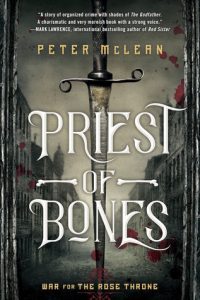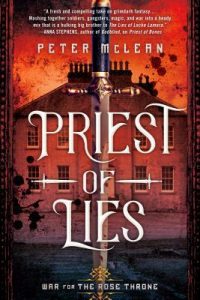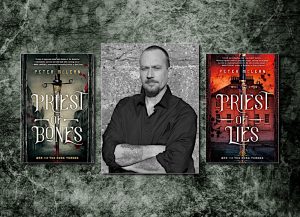Interview with Peter McLean
Peter McLean is the author of the War for the Rose Throne series, including PRIEST OF BONES and PRIEST OF LIES. He was born near London in 1972, the son of a bank manager and an English teacher. He went to school in the shadow of Norwich Cathedral where he spent most of his time making up stories.
By the time he left school this was probably the thing he was best at, alongside the Taoist kung fu he had been studying since the age of 13. He grew up in the Norwich alternative scene, alternating dingy nightclubs with martial arts and practical magic.
He has since grown up a bit, if not a lot, and spent 25 years working in corporate IT. He is married to Diane and is still making up stories.
The War for the Rose Throne trilogy is awesome for all sorts of reasons, one of my favorites being its characters. There are plenty of theories on developing characters floating on the Internet, but do you abide by a particular process? For example, some writers don’t name their characters toward the end whereas George RR Martin mentioned on a “TIFF” interview that names contribute to his character design. Do you use character questionnaires? Etc.
Oh, I have to have a name first and foremost. There’s a power in names, for sure. A name can tell you a lot about a character, about things like class and social standing, and the sort of background they’re from.
From the name “Bloody Anne” for example you can tell that not only has she obviously led a violent life, but that she also comes from a social strata where one’s family name isn’t important enough for her to need to mention it. I always start with a name, and use that to let me discover who this person is and where they’re from.
From that you can work outwards, taking their place of origin and making them a product of their upbringing and lived experiences. A character who grew up in a major city is going to have a very different lived experience to a farm kid, for example, and that sort of thing all helps shape their personalities.
I don’t use character questionnaires as such but I keep a fairly detailed character bible with an entry for each character, noting down easily forgettable things like skin and hair and eye colour, left or right handed, any scars, tattoos or distinguishing features, verbal tics or favourite expressions etc. If they’ve been through major events or traumas those get logged too, and that helps me stay consistent with their characterisation from book to book.
 Do you worldbuild before you plot? In his online lectures, Brandon Sanderson told the class that he drafted ~1,000 pages of worldbuilding for Elantris. Not to harp on about George RR Martin, but he started ASOIAF with the Stark/direwolf scene and the world of Westeros unfurled from there. Where would you place yourself between those poles?
Do you worldbuild before you plot? In his online lectures, Brandon Sanderson told the class that he drafted ~1,000 pages of worldbuilding for Elantris. Not to harp on about George RR Martin, but he started ASOIAF with the Stark/direwolf scene and the world of Westeros unfurled from there. Where would you place yourself between those poles?
Oh good grief no, I can’t imagine doing 1,000 pages of worldbuilding! I work from a completely character-driven perspective, and let the world develop around those characters as the story unfolds.
So far in War for the Rose Throne we’ve seen two cities, Ellinburg and Dannsburg. Obviously there are others, but I don’t know what they’re called and won’t decide until I need to mention one. I think it’s all too easy to get so caught up in building worlds that you don’t ever get around to writing the story, and obviously that’s no help to anyone.
That said, when I do build a place, I’m a stickler for making sure it actually works. I always wince a bit when I’m reading something and there’s a huge city in the middle of the desert, for example, with no indication of where their food and water comes from. Call me a logistics nerd, but even if those details don’t actually go into the book I always make sure it works in my head if nothing else.
I’m sure you’re sick of us readers saying this, but Priest of Bones/Lies is fantastic for fans of Peaky Blinders in the same way The Royal Tenenbaums is fantastic for fans of Arrested Development: similar motifs, different atmospheres. Do you agree with that comparison, or do you think your work resonates more strongly with a different source? What works influenced WFTRT the most? (Also, do you have a preference for the acronym?)
I’m just pleased to have an acronym, to be honest! I do get this question a lot, and yeah, I think it’s a fair one. I do tend to wear my influences on my sleeve and I’m not ashamed to admit I’m a big Peaky Blinders fan, and a fan of gangster films and mob stories in general. When my agent and I were selling the series we actually pitched it as “The Godfather with swords”, because that’s pretty much what it is. WFTRT is a gangster family saga in the tradition of The Godfather and The Sopranos and sure, Peaky Blinders, it’s just set in a Tudor-esque fantasy world instead of New York or post-war Birmingham.
 Just because they’re underrated in general, what’s your favorite literary journal? Any favorite fantasy short stories?
Just because they’re underrated in general, what’s your favorite literary journal? Any favorite fantasy short stories?
I’m a big fan of Grimdark Magazine (and had a WFTRT short story in issue #18) which attracts some top-tier authors, including Lord Grimdark Joe Abercrombie himself in the latest issue.
Fantasy short stories are often tricky as you have so little space for worldbuilding or scene setting unless it’s a spin-off from an existing property, but I really enjoyed Joe’s Sharp Ends collection of First Law stories. I write a lot of short stories myself, mostly for Warhammer 40k, and again there the worldbuilding is already done for you so you can just concentrate on the characters and the plot. Writing stand-alone short stories is a distinct skill, and it’s not something I specialise in.
If you had any advice to give yourself as a noob writer, what would it be?
Finish the thing. In my writing youth I was forever starting projects and never finishing them, but it’s only once you have a complete draft that you can really get down to the work of turning it into a good story. I always say that the editing phase is where you carve your statue – drafting is dragging the block of marble into the studio in the first place.
Peter McLean is the author of PRIEST OF LIES and PRIEST OF BONES, both available now. Find out more about Pete on his website, and follow him on Twitter for news and writing updates.


Hi Peter, I just came across this on my cellphone and I’m pleased to learn how successful and famous you’ve become!
I do hope you’re fine and in good health.
Hope you do remember me.
Love Liane
[…] the Peter and the previous books in his series, you can read David’s previous interview HERE, Peter’s Author Spotlight HERE, and find reviews of his […]